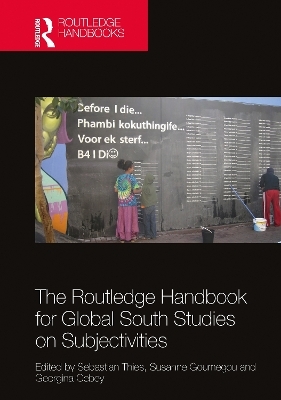
The Routledge Handbook for Global South Studies on Subjectivities
Routledge India (Verlag)
978-1-032-10669-4 (ISBN)
The Routledge Handbook for Global South Studies on Subjectivities provides a series of exemplary studies conjoining perspectives from Asian, African, and Latin American Studies on subjectivity in the Global South as a central category of social and cultural analysis. The contestation of the Northern myth of the autonomous subject—the dispositive that contests subject formation in the South by describing it as fragmented, incomplete, delayed or simply deviant, has been a cornerstone of theory production from the South over the years.
This volume’s contributions offer an interdisciplinary and transarea dialogue, reframing issues of selfhood and alterity, of personhood, of the human, of the commons and contesting the North’s presumption in determining what kind of subjectivities abide by its norms, whose voices are heard, who is recognised as a subject, and, by extension, whose lives matter. In the context of the shifting dynamics of today’s manifold crises, they raise questions regarding how subjectivities act on or resist such forms of contestation, contingency, and indeterminacy.
A major contribution to the growing body of scholarship on the Global South, this handbook will be an essential resource for students, scholars, researchers and instructors in literature, media and culture studies, sociology, anthropology, philosophy, law, politics, visual arts and art history.
Sebastian Thies holds the chair for Ibero-American Literary and Cultural Studies at the University of Tübingen. He was convenor of the Research Training Network “Entangled Temporalities in the Global South” and was one of the coordinators of the BMBF/DAAD thematic network “Futures under construction in the Global South” (2018-20). His research interests include Global South Studies and Latin American literature, film and media studies. He recently co-edited The Routledge Handbook to the Culture and Media of the Americas. Susanne Goumegou is Professor of French and Italian Literature at the Department of Romance Languages at the University of Tübingen and director of the Interdisciplinary Centre for Global South Studies. In addition to her research in French and Italian literature on dream, theory of fiction and illusion, she has worked in Global South Studies with a focus on Francophone Literatures in Sub-Saharan Africa. She has published on African literature in Contracampo: Brazilian Journal of Communication, Études Littéraires Africaines and Philosophia Africana. Georgina Cebey is a faculty member at the School of Architecture of the Autonomus University of Baja California (UABC) and a member of the National System of Researchers of Mexico. She received her PhD in Art History from the National Autonomus University of Mexico (UNAM). Her work focuses on the history of Mexican architecture, with emphasis on the representation of architecture in art and media. In 2017 her book Arquitectura del fracaso won the Vasconcelos national essay prize in Mexico.
I. General Introduction: Contested and Contesting Subjectivities in the Global South 1. Rethinking Subjectivity with the South: A Conceptual Prelude 2. Regimes of Subjectivity and Temporality 3. Precarisation, Articulation, and Recognition as Dynamics of Subjectivation 4. Towards a More Equitable Ecology of Knowledges II. Articulating Subjectivity from the Global South 5. Thinking the World from Africa 6. No Longer Northbound, Now Heading South 7. The Global South and Internationalism 8. Defining Legal Subjectivities for a Postcolonial International Order: The International Legal Controversy over Wars of National Liberation III. Reconfiguring Interpellation 9. The Subject of Teaching/Learning in the Global South 10. Musical Mega-events, Political Communication, and Cross-border Subjectivities in the Colombian-venezuelan Conflict. The Cases of Paz Sin Fronteras (2008) and Venezuela Aid Live (2019) 11. Tears and Concrete: Urban Subjectivities of Mexican Modernity through the Lens of Films IV. Precarised Subjectivities 12. Figurations of the Precarious. Rethinking Studies on the Precarious in the Global South from a Subject-centred Perspective 13. People-on-the-move: An Emerging Historical Figure? 14. When Image is a Body: Modes of Surviving the Colonial Machine 15. Precarious Lives and the Figure of the Wound in Chilean Literature: Hijo de ladrón (1951) by Manuel Rojas and Lumpérica (1983) by Diamela Eltit 16. Hyper-consumerism, Violence and Endriago. Female Subjectivities in the Border Narcoculture of Orfa Alarcóns Perra Brava V. Entangled Regimes of Temporality 17. The Time of the Commons and the Subject of the South 18. Disruptive Temporality and Post-apocalyptic Subjectivity: Narrating Violence in Tierno Monénembo’s Les écailles du ciel 19. Questioning the “New” Zimbabwe: Biomythography and Political Subjectivity in Panashe Chigumadzi’s These Bones Will Rise Again (2018) VI. Contesting the Western Subject of Knowledge 20. Zoē-assemblage: Immanent Life in the Age of the Anthropocene 21. Conversing with María Luisa Chacarito: A Ralámuli Woman’s Perceptions on Life in an Interconnected World 22. Subjectivities, Agency and Ritual Performance in the Garhwal Himalayas 23. Just Thinking
| Erscheinungsdatum | 22.04.2024 |
|---|---|
| Reihe/Serie | Transdisciplinary Souths |
| Zusatzinfo | 11 Halftones, color; 11 Illustrations, color |
| Verlagsort | London |
| Sprache | englisch |
| Maße | 174 x 246 mm |
| Gewicht | 866 g |
| Themenwelt | Kunst / Musik / Theater |
| Recht / Steuern ► Allgemeines / Lexika | |
| Recht / Steuern ► EU / Internationales Recht | |
| Sozialwissenschaften ► Soziologie ► Spezielle Soziologien | |
| ISBN-10 | 1-032-10669-7 / 1032106697 |
| ISBN-13 | 978-1-032-10669-4 / 9781032106694 |
| Zustand | Neuware |
| Haben Sie eine Frage zum Produkt? |
aus dem Bereich


